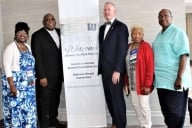You have /5 articles left.
Sign up for a free account or log in.
Last Monday, Hurricane Sandy was still being spoken of in the mainstream media as a threat to the East Coast. By late Tuesday, the vocabulary had changed -- Sandy was a "super-storm", flooding was pervasive and (for too many) fatal, and climate change was here and now. Denialists may not have changed their tunes all that much, but (at least in my perception) the tide (sorry about that, folks) of public climate discourse in North America had turned. The operative phrase seemed to be "new normal". Nobody who used it was smiling.
A few observations about the current frame of discussion:
- Climate change is no longer something that might happen by the middle or the end of the 21st century. It's now.
- Climate change is no longer something that might be happening somewhere near the North Pole. It's here.
-
Climate change is no longer about CO2. It's about water.
- CO2 is colorless, seemingly weightless, something each of us has in our lungs, not particularly threatening.
- Water is visible, touchable, weighty. It can hit you pretty hard. If it gets in your lungs, you're on your way to being dead. It can be (and seemingly is) a clear and present danger.
- The major costs associated with climate change are no longer the supposedly unbearable and possibly needless costs of long-term prevention/avoidance. They're the urgent, immediate, totally necessary costs of recovery and protection.
- The government is no longer the national nanny trying to protect us from a bogey-man created by imaginative pencil-necked scientists chasing research funding. It's now the arm of the nation most capable of providing recovery assistance, and most logically positioned to provide long-term protective infrastructure.
This Wednesday, Bill McKibben kicks off 350.org's "Do the Math" tour. As part of that initiative, McKibben is asking colleges and universities to divest their investment portfolios of fossil-fuel-related stocks. His point is that it's logically and ethically inconsistent for institutions which exist to prepare young people for the future to invest their assets in corporations actively involved in destroying that future. (Personally, I'd add that it's also logically inconsistent for institutions which promote public appreciation of science to invest in organizations which work to destroy the image of science in the public consciousness.)
In my efforts to engage Greenback students on issues of sustainability, I've noticed that they (particularly the undergraduates) don't seem much affected by information that's complex, or detailed, or presented unemotionally. For whatever set of reasons, the informational presentations that get the strongest positive reactions are the most Disney-esque. Simple stories. Good guys and bad guys. Clear (often misleadingly clear) portrayal of right and wrong. The fate of the world in the balance, and no James Bond or Bruce Willis to be found.
My hope is that Sandy has given us on the East Coast a simple story line -- one that complements the stories in other parts of the country that focus on drought and fires. And that McKibben's road show can be effective in giving us at least an incomplete cast of characters in black hats. (Or, as Disney is acquiring LucasFilms, black space armor.)





